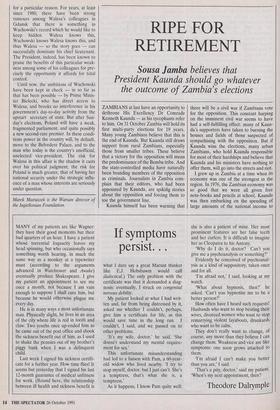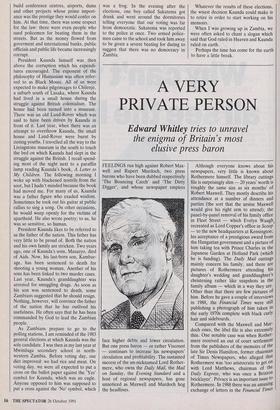RIPE FOR RETIREMENT
Sousa Jamba believes that President Kaunda should go whatever the outcome of Zambia's elections
ZAMBIANS at last have an opportunity to dethrone His Excellency Dr Comrade Kenneth Kaunda — as his sycophants refer to him. On 31 October Zambia will hold its first multi-party elections for 19 years. Many young Zambians believe that this is the end of Kaunda. But Kaunda still draws support from rural Zambians, especially those from smaller tribes. These believe that a victory for the opposition will mean the predominance of the Bemba tribe. And the state-controlled media have naturally been branding members of the opposition as criminals. Journalists in Zambia com- plain that their editors, who had been appointed by Kaunda, are spikitig stories about the opposition and forcing them to toe the government line.
Kaunda himself has been warning that there will be a civil war if Zambians vote for the opposition. This constant harping on the imminent civil war seems to have had a self-fulfilling effect: many of Kaun- da's supporters have taken to burning the houses and fields of those suspected of sympathising with the opposition. But if Kaunda wins the elections, many urban Zambians, who hold Kaunda responsible for most of their hardships and believe that Kaunda and his ministers have nothing to offer them, will go into the streets and riot.
I grew up in Zambia at a time when its economy was one of the strongest in the region. In 1976, the Zambian economy was so good that we were all given free note-books and pencils at school. Kaunda was then embarking on the spending of large amounts of the national income to build conference centres, airports, dams and other projects whose prime import- ance was the prestige they would confer on him. At that time, there was some respect for the law: there were even people who sued policemen for beating them in the streets. But as the money flowed from goverment and international banks, public officials and public life became increasingly corrupt.
President Kaunda himself was then above the corruption which his expendi- tures encouraged. The exponent of the philosophy of Humanism was often refer- red to as Black Moses. All of us were expected to make pilgrimages to Chilenje, a suburb south of Lusaka, where Kaunda had lived in a small house during the struggle against British colonialism. The house had been turned into a museum. There was an old Land-Rover which was said to have been driven by Kaunda in front of it. Last year, when there was an attempt to overthrow Kaunda, the small house and Land-Rover were burnt by rioting youths. I travelled all the way to the Livingstone museum in the south to touch the bed on which Kaunda had slept in the struggle against the British. I recall spend- ing most of the night next to a paraffin lamp reading Kaunda's book, A Letter to My Children. The following morning I woke up with blackened nostrils from the soot, but I hadn't minded because the book had moved me. For many of us, Kaunda was a father figure who exuded wisdom. Sometimes he took out his guitar at public rallies to sing a song. On other occasions, he would weep openly for the victims of apartheid. He also wrote poetry; to us, he was so sensitive, so human.
President Kaunda likes to be referred to as the father of the nation. This father has very little to be proud of. Both the nation and his own family are stricken. Two years ago, one of Kaunda's sons, Masuzyo, died of Aids. Now, his last-born son, Kambar- age, has been sentenced to death for shooting a young woman. Another of his sons has been linked to two murder cases. Last year, Kaunda's granddaughter was arrested for smuggling drugs. As soon as his son was sentenced to death, some Zambians suggested that he should resign. Nothing, however, will convince the father of the nation that he has outlived his usefulness. He often says that he has been commanded by God to lead the Zambian people.
As Zambians prepare to go to the polling stations, I am reminded of the 1983 general elections at which Kaunda was the sole candidate. I was then in my last year at Mwiniluga secondary school in north- western Zambia. Before voting day, our diet improved: we had rice and meat. On voting day, we were all expected to put a cross on the ballot paper against the 'Yes' symbol for Kaunda, which was an eagle. Anyone opposed to him was supposed to put a cross against the 'No' symbol, which was a frog. In the evening after the elections, one boy called Sakatema got drunk and went around the dormitories telling everyone that our voting was far from democratic. Sakatema was reported to the police at once. Two armed police- men came to the school and took him away to be given a severe beating for daring to suggest that there was no democracy in Zambia. Whatever the results of these elections, the wisest decision Kaunda could make is to retire in order to start working on his memoirs.
When I was growing up in Zambia, we were often asked to chant a slogan which said that God ruled in Heaven and Kaunda ruled on earth.
Perhaps the time has come for the earth to have a little break.









































 Previous page
Previous page